

Stanford research shows pitfalls of homework. By Clifton B.
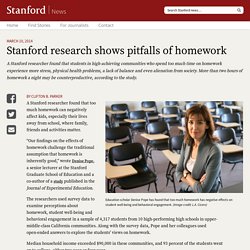
Parker Education scholar Denise Pope has found that too much homework has negative effects on student well-being and behavioral engagement. What research says about the value of homework: Research review. History of the homework debate.
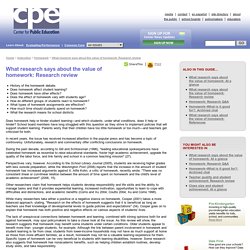
Does homework affect student learning? Does homework have other effects? Does the effect of homework vary with students age? Research Trends: Why Homework Should Be Balanced. Homework: effective learning tool or waste of time?
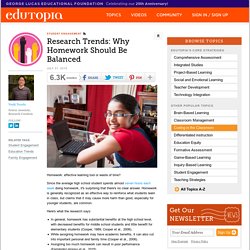
Since the average high school student spends almost seven hours each week doing homework, it's surprising that there's no clear answer. Homework is generally recognized as an effective way to reinforce what students learn in class, but claims that it may cause more harm than good, especially for younger students, are common. Don't Give Homework! with Alfie Kohn. Alfie Kohn: "Making students work a 'second shift'" The Truth About Homework. September 6, 2006 By Alfie Kohn Para leer este artículo en Español, haga clic aquí.
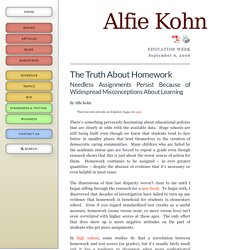
There’s something perversely fascinating about educational policies that are clearly at odds with the available data. Huge schools are still being built even though we know that students tend to fare better in smaller places that lend themselves to the creation of democratic caring communities. Many children who are failed by the academic status quo are forced to repeat a grade even though research shows that this is just about the worst course of action for them. Does Homework Improve Learning? Chapter 2 of THE HOMEWORK MYTH(Da Capo Press, 2006)Copyright © 2006 by Alfie Kohn By Alfie Kohn Because the question that serves as the title of this chapter doesn’t seem all that complicated, you might think that after all this time we’d have a straightforward answer.
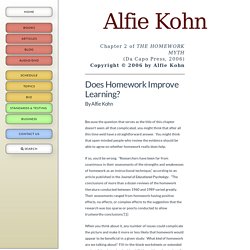
Homework: New Research Suggests It May Be an Unnecessary Evil. A brand-new study on the academic effects of homework offers not only some intriguing results but also a lesson on how to read a study — and a reminder of the importance of doing just that: reading studies (carefully) rather than relying on summaries by journalists or even by the researchers themselves.
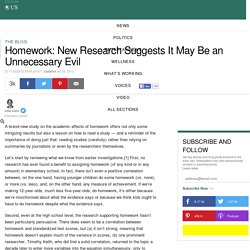
Let’s start by reviewing what we know from earlier investigations.[1] First, no research has ever found a benefit to assigning homework (of any kind or in any amount) in elementary school. In fact, there isn’t even a positive correlation between, on the one hand, having younger children do some homework (vs. none), or more (vs. less), and, on the other hand, any measure of achievement. Rethinking Homework. January/February 2007 By Alfie Kohn [For a more detailed look at the issues discussed here — including a comprehensive list of citations to relevant research and a discussion of successful efforts to effect change– please see the book The Homework Myth.]
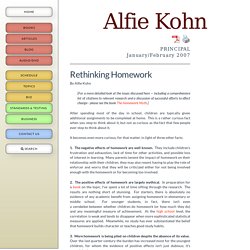
After spending most of the day in school, children are typically given additional assignments to be completed at home. This is a rather curious fact when you stop to think about it, but not as curious as the fact that few people ever stop to think about it. Review: The Myth of Homework and The Case Against Homework. This article reviews two books; The Myth of Homework: Why our kids get too much of a bad thing by Alfie Kohn and The Case Against Homework: How homework is hurting our children and what we can do about it by Bennett & Kalish Few topics generate more conversation at the school gate than homework but there is little discussion amongst educationalists or teachers during their training or in practice.
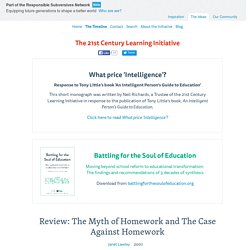
Yet these issues demand consideration by all who care about young people. Homework – what Alfie Kohn terms “this modern cod liver oil” – has come to dominate home life for many children, starting in the kindergarten, taking longer and longer and often encouraged by ambitious parents in a misguided focus on competition. Parents watch their children “mechanically grind out their assignments, perhaps frustrated by those that are too difficult, bored by those that are too easy, perhaps exhausted from having to do too much.”